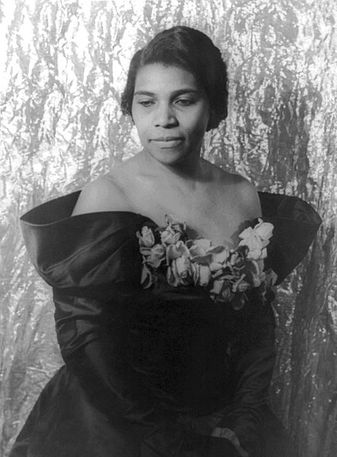On this day: Remembering Marian Anderson’s Easter Sunday Performance
But on April 9th, 1939 she became not just a voice but a symbol of civil rights. That year, Anderson was scheduled to perform in front of an integrated audience at Constitution Hall in Washington D.C—a performance that was protested and ultimately shut down by the Daughters of the American Revolution (as a result, thousands of DAR members, including First Lady Eleanor Roosevelt, resigned from the organization).
President Franklin D. Roosevelt worked with Walter White, the executive secretary of the National Association for the Advancement of Colored People, to convince the Secretary of the Interior to arrange an alternate venue. Anderson went on to perform a universally acclaimed open-air concert on Easter Sunday of 1939. The impromptu performance took place on the steps of the Lincoln Memorial and was listened to by 75,000 people in attendance and millions more on the radio. It was widely considered a victory in the fight against racial prejudice. And at the forefront was Marian Anderson, a woman who continued to break barriers throughout the remainder of her career.
Four years later, Anderson ended up singing at Constitution Hall for a Red Cross benefit. She later became the first black person to perform at the Metropolitan Opera in 1955 and later worked as a delegate to the United Nations Human Rights Committee. She was active in the Civil Rights Movement, again singing on the Washington Mall during the March on Washington in 1963. That same year she was awarded the Presidential Medal of Freedom, followed by the National Medal of the Arts in 1986.
In his book “The Sound of Freedom: Marian Anderson, the Lincoln Memorial and the Concert That Awakened America,” historian and academic Raymond Arsenault highlights this turning point in Anderson’s career, but also delves deeper into the life of Anderson: her upbringing, her classical music training, and the varying versions of her stardom between the United States and Europe. Having to support her family with her singing career at twelve years of age, following the untimely passing of her father, Anderson knew that her voice would have to take her far. As a black classical singer, she was routinely discriminated against in the United States, causing her to go to Europe for further study and opportunities to perform. Her European debut was in London and she ended up spending a few years touring Europe, becoming very popular abroad. Upon her return to the United States, she was a media spectacle. Yet her international fame could not break down the barriers of injustice present in her homeland. Her denial by the DAR gave Anderson a new voice—one that she did not know she had—and she used it to its utmost ability.
Arsenault is currently working on a much-anticipated account of Arthur Ashe’s life not just as a tennis professional, but focusing on his contributions to civil rights, both within the United States and abroad.

